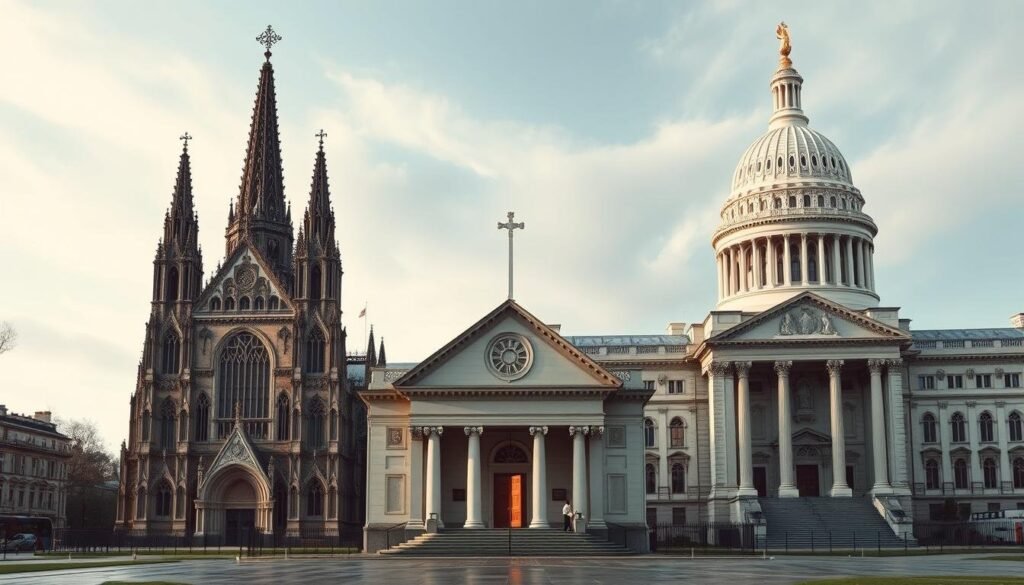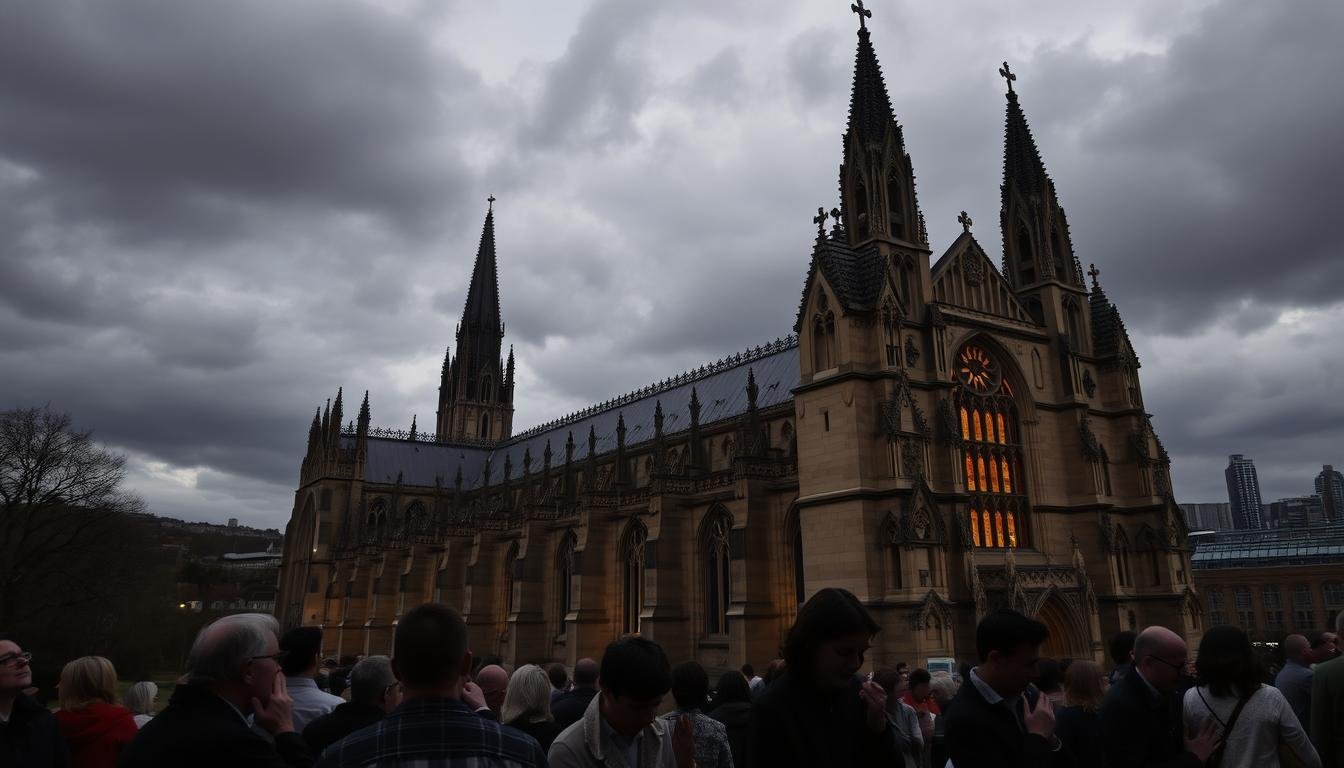Have you heard about the debate on Christianity in the UK? It’s important to know what’s happening and how it affects you.
Many wonder if Christianity is being restricted or banned in the UK. We’ll look at the facts and myths to give you a clear picture.
Exploring this topic, you’ll learn the essential points. This will help you understand Christianity’s status in the UK better.
Contents
- 1 The Current Status of Christianity in the UK
- 2 Origins of the “Is Christianity Banned in the UK” Claim
- 3 UK Laws on Religious Freedom and Expression
- 4 Examining Controversial Cases
- 5 Is Christianity Banned in the UK? Fact vs. Fiction
- 6 UK vs. US Religious Freedom: A Comparison
- 7 Conclusion: Understanding Religious Freedom in Modern Britain
- 8 FAQ
- 8.1 Is Christianity still a protected faith in the UK?
- 8.2 Can Christians express their beliefs freely in the UK?
- 8.3 Are there any laws in the UK that restrict Christian practices?
- 8.4 How does the UK’s religious freedom compare to that of the US?
- 8.5 Have there been notable cases of Christians facing discrimination in the UK?
- 8.6 What is the current social attitude towards Christianity in the UK?
- 8.7 Can Christians display religious symbols in the workplace?
- 8.8 Are there any specific challenges facing Christians in the UK today?
The Current Status of Christianity in the UK
Exploring Christianity in the UK today shows a complex picture. It has long been a big part of UK culture. Yet, how it’s practiced and its influence are changing.
The UK’s laws on religion protect the freedom to practice any faith, including Christianity. This freedom is a cornerstone of the country’s values.
UK laws aim to safeguard religious freedom. This means Christians can follow their faith openly. But, sometimes, this freedom can clash with other laws, like those on equality and human rights.
The Human Rights Act 1998 protects religious freedom in the UK. It makes sure people can show their faith, but with some limits.
It’s worth noting that while Christianity isn’t banned, there’s a lot of talk about its place in public life. This debate touches on how to balance religious identity with a diverse society.
Origins of the “Is Christianity Banned in the UK” Claim
As you look into the UK’s religious scene, you might ask how the idea that Christianity is banned started. This belief comes from different social, legal, and media influences.
The shift in religious groups in the UK has played a big role. The census shows fewer people call themselves Christian, while others do. This change has made the UK more diverse, sometimes seen as a ban on Christianity.
Several things have made people think Christianity restrictions UK are real:
- More secularism and laws that aim for religious fairness
- Wrong understanding of hate crime laws and how they’re used
- Media stories about Christianity-related controversies
- Feeling that Christian views are ignored in public talks
The idea of UK Christian persecution often comes up in cases where people feel their religious rights are limited. But, it’s important to tell the difference between real limits and the challenges of living in a diverse, secular world.
To understand where this claim comes from, we need to look at how these factors interact. We must see how they affect public and media views.
UK Laws on Religious Freedom and Expression
It’s important to know about the UK laws that protect religious freedom. The UK has strong laws that help everyone express their religion. The Equality Act 2010 and the Human Rights Act 1998 are key.
The Equality Act 2010 stops discrimination based on religion or belief. It makes sure people are treated fairly, no matter their beliefs. For example, employers can’t discriminate against someone because of their religion, unless it’s needed for the job.
The Human Rights Act 1998 makes the European Convention on Human Rights part of UK law. Article 9 protects the right to freedom of thought, conscience, and religion. This means people can change their beliefs and practice their religion freely.
Even though these laws protect religious freedom, they can be complex. Courts have to balance religious rights with other rights, like equality. This is important in a society with many different beliefs.
For instance, cases about religious expression often deal with equality and fairness. The courts must weigh these interests carefully. This ensures the laws are applied fairly.
In summary, the UK laws on religious freedom and expression aim to protect everyone’s right to practice their religion. Knowing these laws is key to understanding religious expression in the UK.
Examining Controversial Cases
Looking into specific cases helps us understand if Christianity is banned in the UK. These cases show the struggle between religious freedom and other rights.
John Sherwood’s case is a good example. Sherwood, a Christian, faced legal challenges because of his beliefs. His case was closely looked at by the legal system.
Legal Outcomes and Precedents
Legal results of these cases set important rules for future religious freedom cases. In Sherwood’s case, the law had to weigh his right to express his faith against other factors.
The Nadia Eweida Cross Case
Nadia Eweida’s case is also key. Eweida, a British Airways worker, was in a big controversy. She wore a cross necklace, showing her Christian faith, while working.
Employment Tribunal Decisions on Religious Beliefs
Employment tribunal rulings, like Eweida’s, give us a peek into UK laws on religious practices at work. These rulings show how the law handles religious freedom in the workplace.
In summary, looking at these cases gives us a detailed view of Christianity in the UK. There are hurdles, but the law keeps adapting to new social norms and religious practices.
Is Christianity Banned in the UK? Fact vs. Fiction
Some people think Christianity is banned in the UK. But is this true? We’ve looked into how Christianity and UK law interact. Let’s get to the bottom of this.
The UK’s laws protect your right to practice any religion, including Christianity. The Human Rights Act 1998 and the Equality Act 2010 are key in keeping this right safe. But, how these laws are applied can sometimes cause problems.
There have been big cases that have made people wonder about religious freedom in the UK. These cases have raised questions, but they don’t mean Christianity is banned. They show the complexity of balancing religious freedom with the needs of a diverse society.
To wrap it up, Christianity is not banned in the UK. The law still protects your right to practice Christianity, even with ongoing debates. You can still practice Christianity openly, but it must follow the laws of the land.
In short, while there are debates and challenges, Christianity is not banned in the UK. It’s all about finding the right balance between religious freedom and other legal rights.
UK vs. US Religious Freedom: A Comparison
Religious freedom is key in both the UK and the US. Yet, how it’s practiced and protected varies a lot. It’s interesting to see how these differences affect Christians and other religious groups every day.
In the UK, the Human Rights Act of 1998 protects religious freedom. It’s based on the European Convention on Human Rights. People can practice their religion freely, but there are limits. These limits are in place if the practice goes against public interest or discriminates.
The US has a clear separation of church and state, thanks to the First Amendment. This amendment stops the government from making laws that favor one religion or stop others. The US allows for more religious freedom, letting people express their beliefs in many ways.

Here’s a table comparing the UK and US approaches to religious freedom:
| Aspect | UK | US |
|---|---|---|
| Legal Framework | Human Rights Act 1998 | First Amendment |
| Separation of Church and State | Less explicit, some state churches | Explicit separation |
| Religious Expression | More regulated, especially in public institutions | More permissive, wider range of expressions allowed |
Both countries value religious freedom, but their laws and cultures shape it differently. Knowing these differences helps us understand how religious freedom is lived in each country.
Conclusion: Understanding Religious Freedom in Modern Britain
Exploring Christianity in the UK shows that religious freedom is complex. Some say Christianity is banned, but the truth is more nuanced. It depends on the legal and social context.
The UK’s laws allow Christians to practice their faith. Yet, debates over certain issues raise questions about freedom’s limits. Looking at these debates and comparing the UK to countries like the US helps us understand better.
In modern Britain, Christianity is practiced in many ways. This shows the country’s diverse culture. It’s important to respect religious freedom while dealing with the challenges of a multicultural society.
Staying updated on Christianity in the UK and religious freedom helps us grasp this complex topic. It allows us to see the role of religion in today’s Britain more clearly.
FAQ
Is Christianity still a protected faith in the UK?
Yes, Christianity is still protected in the UK. The Equality Act 2010 and the Human Rights Act 1998 ensure religious freedom and expression.
Can Christians express their beliefs freely in the UK?
Christians in the UK have the right to share their beliefs. But, there are limits, especially in jobs or public services. Here, expressing beliefs might face restrictions or scrutiny.
Are there any laws in the UK that restrict Christian practices?
The UK has laws to keep public order and stop hate speech. These laws might seem to limit some Christian practices. But, they aim to prevent harm, not target Christianity.
How does the UK’s religious freedom compare to that of the US?
Both the UK and the US protect religious freedom. But, their laws and cultural settings are different. The US has its Constitution, while the UK relies on statutes and the European Convention on Human Rights.
Have there been notable cases of Christians facing discrimination in the UK?
Yes, there have been cases where Christians faced discrimination in the UK. These often involve jobs or services. Cases like Nadia Eweida’s show the balance between religious freedom and other rights.
Views on Christianity in the UK vary. There’s a trend towards secularization and fewer traditional practices. Yet, many Christians still openly practice their faith.
Can Christians display religious symbols in the workplace?
Whether Christians can show religious symbols at work depends on workplace policies. Some employers might ban religious symbols, leading to disputes over freedom of religion.
Are there any specific challenges facing Christians in the UK today?
Christians in the UK face challenges like expressing their faith, employment rights, and social views. Debates on same-sex marriage and abortion also affect some Christians, as their views might not match societal norms.

Marcellus Stark is an investigative journalist from San Francisco, USA. He writes about global bans, rules, and unusual laws. He shares clear, interesting, and well-researched stories that help readers understand surprising facts worldwide.

